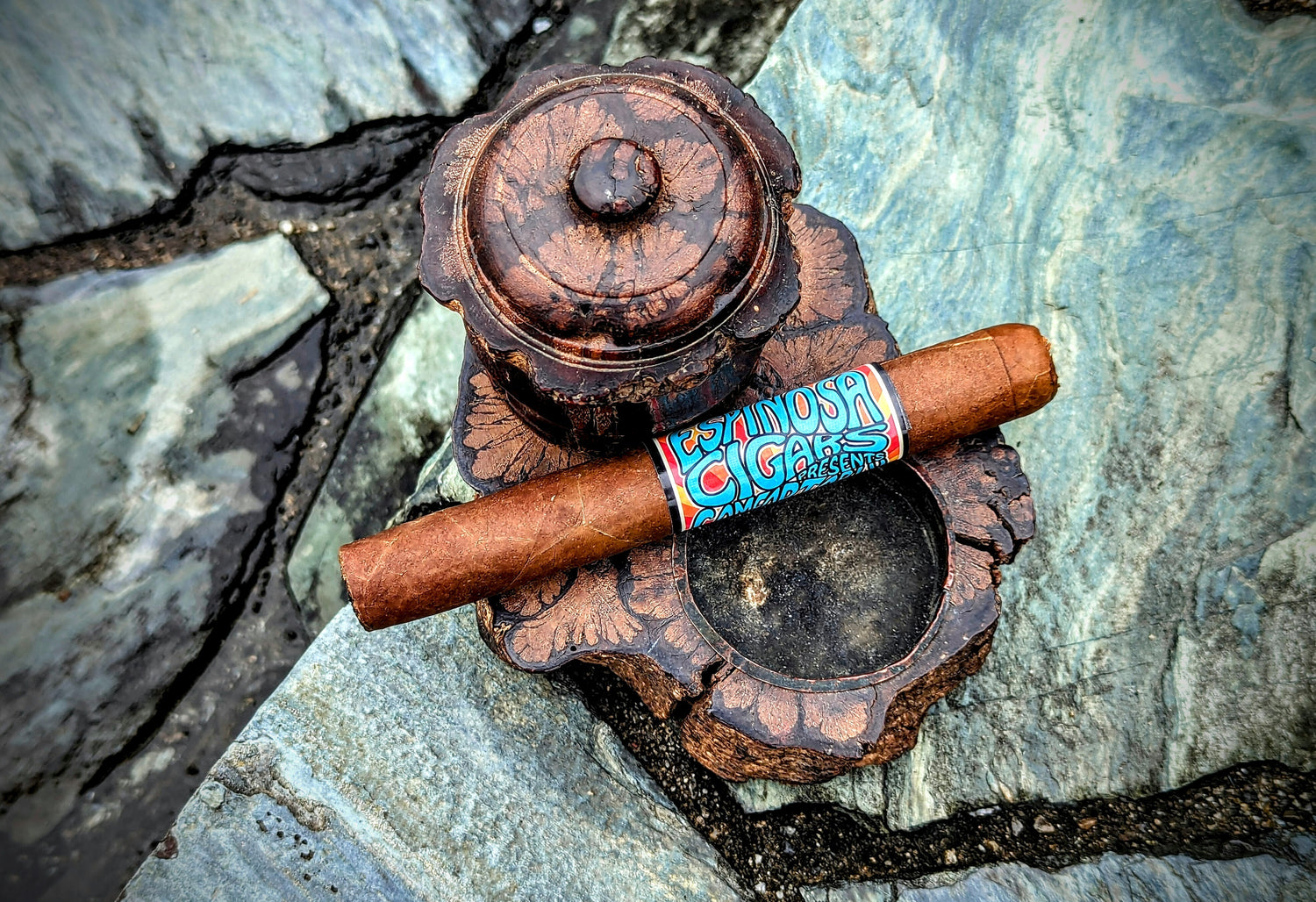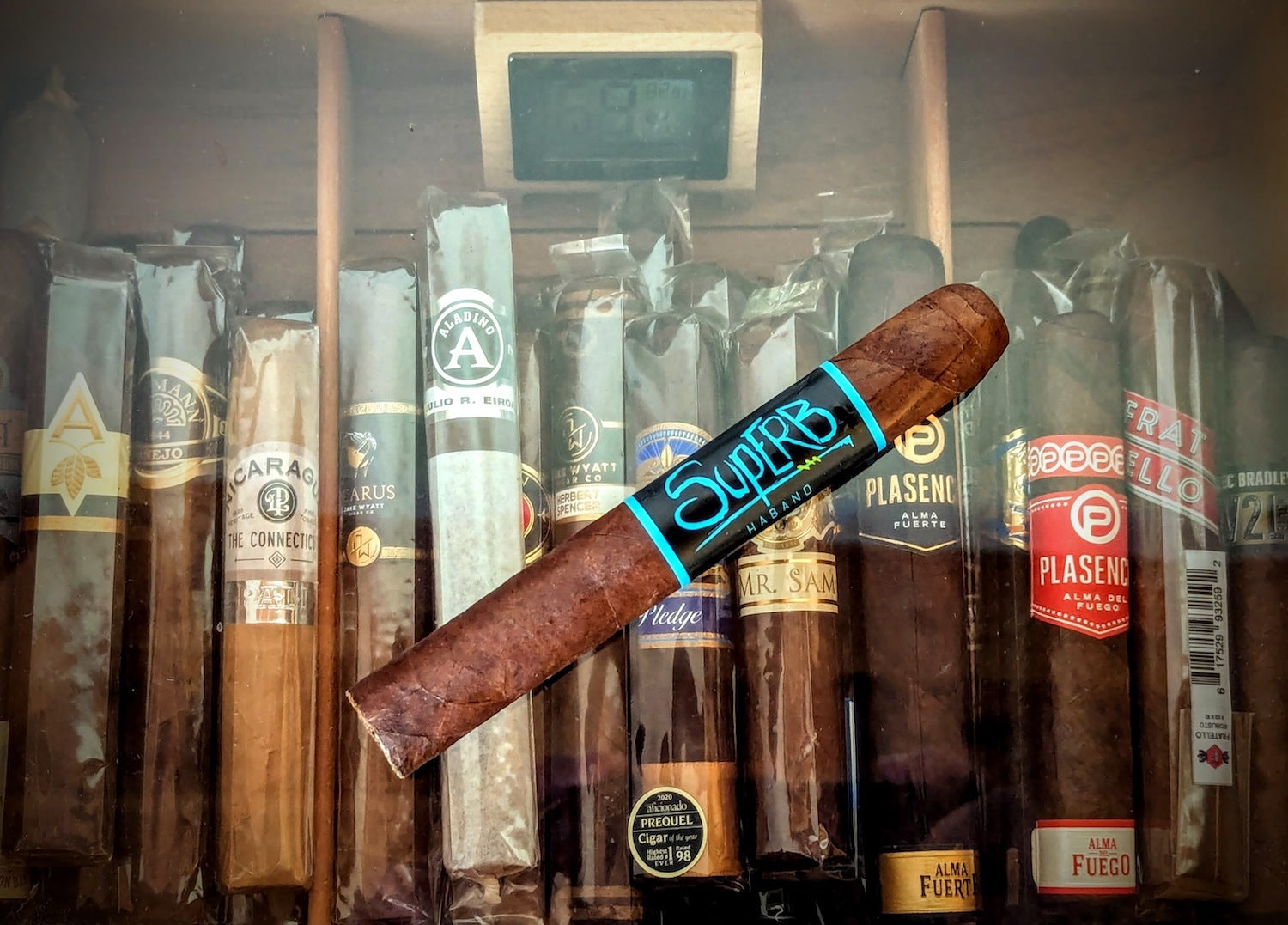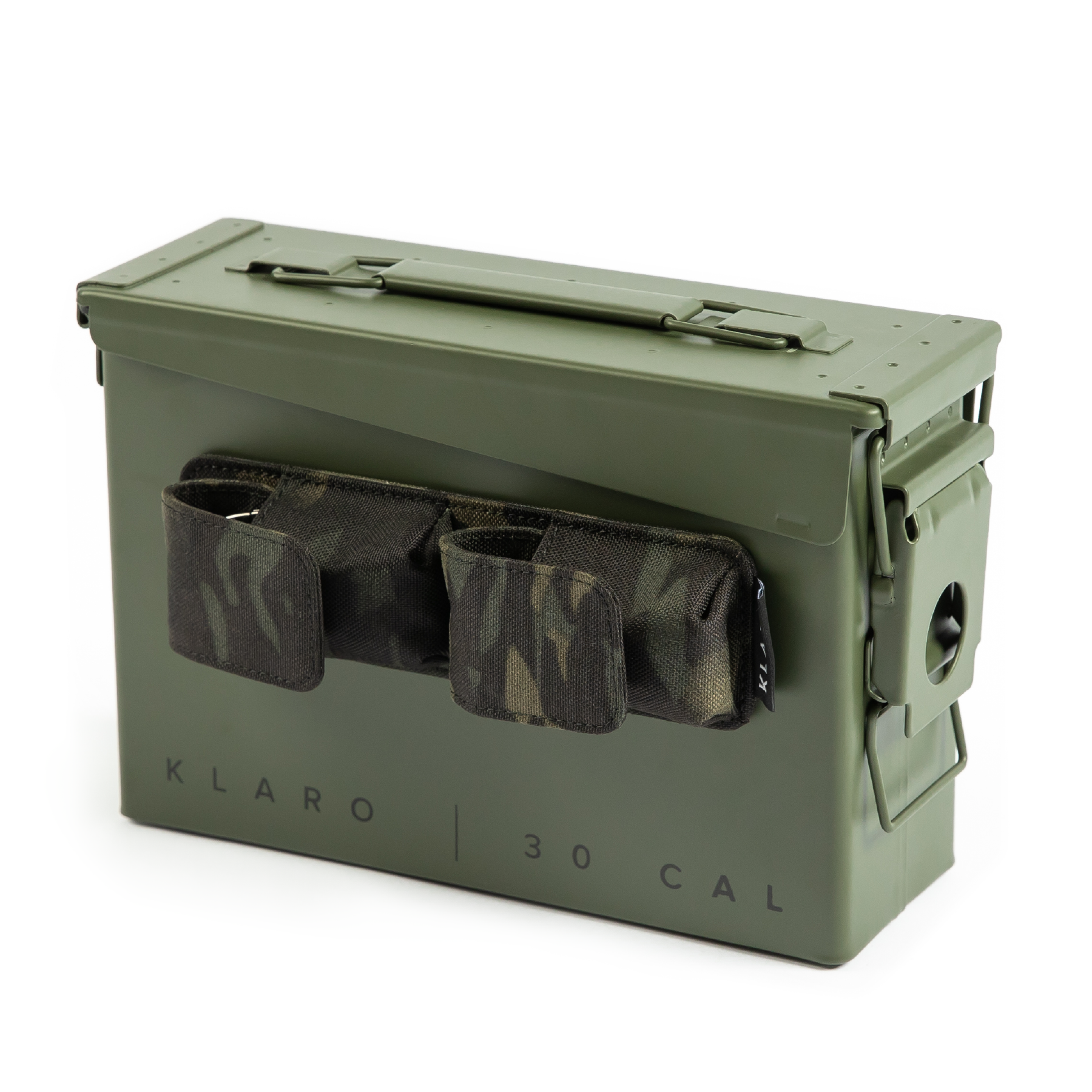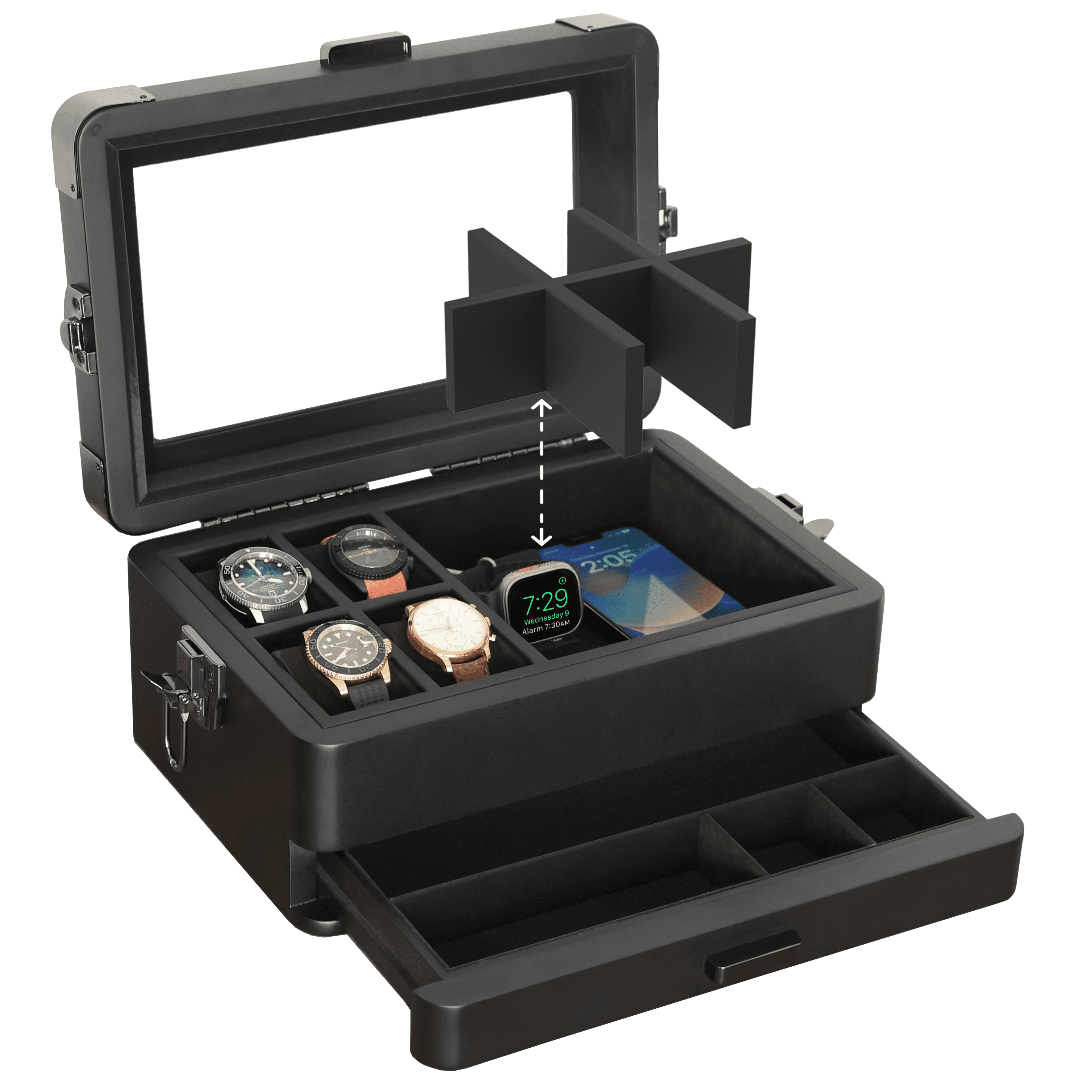Plain and simple, humidors allow cigar smokers to store cigars for extended periods of time. It’s all about cigar preservation. As we know, cigars are delicate products that may dry out, mold, or worse if stored in the wrong conditions. Cigars must be stored at the right humidity levels and the right temperature to maintain their ideal smoking condition. Otherwise, you stand to ruin perfectly good cigars.
Humidors are typically made with Spanish cedar and a humidification source so that you can maintain the ideal humidity and temperature levels your cigars require—not too wet, not too dry. A great humidor will be responsive to changes around it so that your cigars don’t experience significant fluctuations in temperature or humidity.
But what is a cigar’s humidor lifespan? How long can you expect optimal cigar humidity from your humidor before your cigars lose flavor or might possibly dry out regardless of the surrounding conditions? Today we’re talking long-term cigar storage. And we answer the question: “How long will a cigar last in a humidor?”
Understanding Humidors

First, let’s explore how humidors work.
ヒュミドールとは?
Humidors are cigar containers that, at their most basic, include a humidification source and an airtight seal. This way you can moderate the internal humidity levels. The best material to use in a humidor is Spanish cedar, which acts as a humidity buffer, storing excess humidity when conditions are especially humid and releasing it when conditions dry out. So as the environment around your humidor changes, the inside remains relatively consistent.
加湿器の種類
Humidors come in all shapes and sizes. You may own a desktop humidor, capable of storing about 150 cigars. Or you’ve seen larger humidor cabinets. And if you’ve ever visited a cigar shop and perused the cedar-lined shelves of a glass room, you’ve also been inside a humidor.
Common humidor types include:
- 卓上型加湿器
- トラベルヒュミドール
- キャビネット加湿器
- Electric Humidors
But every humidor typically has three elements: a humidification source (or humidifier), an airtight seal, and a component like Spanish cedar that absorbs and releases humidity. A fourth common element is the inclusion of a hygrometer so you can measure the relative humidity within.
How Humidors Work
The humidifier naturally releases humidity into the humidor. When seasoning a humidor—which is the act of preparing your humidor prior to storing cigars—the humidor absorbs humidity within the Spanish cedar, saturating it. When you add cigars to your humidor, they will naturally absorb humidity in the air, but the saturated Spanish cedar will compensate so that your humidor still maintains the desired humidity levels.
Some electric humidors may allow you to control the internal temperature of a humidor. But you can still maintain relatively consistent temperatures on a non-electric humidor by storing them away from sunlight, vents, or A/C units.
Choosing the Right Humidor
The size humidor you choose should be based on how often you smoke and how large of a cigar collection you want to maintain. Humidors vary widely in capacity, anywhere from 10-15 cigars all the way up to several thousand.
Regardless of size, you still want a humidor that uses sufficient amounts of Spanish cedar and a strong enough humidifier to control the humidity levels within.
Humidors come with active or passive humidification systems. A passive humidification system releases humidity through natural processes of osmosis and evaporation. Active humidification systems use electric humidifiers that force humidity into the air.
Factors Affecting Cigar Longevity in a Humidor

Without question, some humidors will preserve cigars better—and longer—than others. This comes down to consistency. The more fluctuation occurs, the less likely your cigars are to last. But what levels are you trying to maintain?
Humidity and Temperature Levels
Consider the climate where cigar tobacco is fermented and aged: the tobacco barns in South America often maintain humidity and temperature around 70% relative humidity and 70 degrees Fahrenheit. Obviously, this fluctuates, but this 70-70 rule is an easy one to use as a baseline.
We typically suggest you store cigars between 68%-72% relative humidity. This may change depending on the type of cigar you store or if you are aging cigars.
Anything less than 68% relative humidity, and you risk your cigars drying out. Dried-out cigars may smoke unevenly, more quickly, or may even crack or break, ruining them. Anything above 73%, and your cigars are more susceptible to molding. Even if they don’t mold, the added humidity can cause combustion issues when it comes time to smoke.
The more you can keep your humidor at these recommended levels, the longer your cigars will last. Even if your cigars happen to dry out or become too humid, you can often return them to a smokeable condition. But the more fluctuation occurs, the more likely you are to damage your cigars beyond repair.
ヒュミドールのメンテナンス
You can limit the amount of fluctuation that occurs in your humidor by first investing in a quality humidor. A quality humidor will have sufficiently thick Spanish cedar, an airtight seal, and a sufficient humidification system. If you season this properly, you set yourself up for a long period of good performance.
If you find that your humidor is fluctuating in humidity levels, consider reseasoning your humidor. You may also need to refill your humidification source regularly. On Klaro humidors, you do that with Klaro humidor solution. The more consistent you keep this, the longer your cigars will last.
Cigar Quality and Age
The quality of the cigar you put into your humidor will also determine how long it stores. The same goes for quantity. If you overfill your humidor with dried-out cigars, it may be difficult to restore these cigars to their best condition and maintain the humidor’s humidity level. You may need to add a significant amount of humidor solution. Even then, it’s not guaranteed.
The good news is that cigars are made for long-term storage. In fact, some improve with age. Yes, the organic compounds in the tobacco begin to break down over time. But when done correctly—and slowly—cigars can become smoother as they age. Many cigar connoisseurs deliberately age certain cigars anywhere from six months to a year depending on the desired effect.
Best Practices for Maintaining Your Humidor

Long-term cigar storage can only be done with a good humidor. To keep your humidor working at its best, consider the following strategies to maintain your humidor.
ヒュミドールの味付け
Seasoning your humidor sets it up for long-term performance. The seasoning process bolsters the interior wood with enough moisture to sustain your desired levels even as seasons and external humidity levels vary drastically.
When you open your humidor to remove or add a cigar, you expose your cigar collection to the outside air and its relative humidity. This will change the levels inside your humidor. If seasoned correctly, it will quickly adjust and return to normal. If not, your humidor will struggle to maintain consistent humidity levels.
For long-term cigar storage, you need a humidor that quickly returns to the correct humidity levels.
Monitoring Humidity and Temperature
So how do you know if the humidity in your humidor is too high or too low? A hygrometer uses internal sensors to measure the relative humidity inside your humidor. We recommend using a digital hygrometer over analog versions as they are typically more accurate. If your humidor includes a built-in hygrometer, the sensors must be sealed inside so they are not affected by outside air.
Humidification Techniques
When using a humidifier that uses water or humidor solution, you may need to refill these components somewhat regularly depending on how well the humidor is seasoned and how often the humidor is opened.
Rotating Cigars
Cigars stored closest to the humidifier in your humidor will be exposed to the highest humidity levels. To keep these levels even, we recommend rotating your cigars every week or two so that each cigar gets regular exposure away and close to the humidifier.
Signs Your Cigars Are Past Their Prime

As you age your cigars, you should monitor your humidor’s internal humidity and temperature. But your cigars can also indicate how well they are aging.
Visual Indicators
If you detect any mold or mildew, you’re likely too late. This is an obvious sign that your cigars have been affected by too much humidity and are no longer good to smoke.
If you see that any cigar wrappers (the outermost layer of tobacco) have cracks, those have dried out significantly and are likely no longer good to smoke.
Taste and Aroma Changes
If you continue to smoke cigars from your humidor and notice that the taste is bland, dusty, or acrid, they may have been stored too long and have begun to deteriorate. The same goes for odor: your cigars should still maintain an odor reminiscent of when you originally stored them.
Physical Changes
Perhaps the best way to determine how your cigars are aging is with a physical test. Check to see if your cigars are too dry by placing them near your ear and rolling the tobacco between your fingers. If you detect any crackling of the filler tobacco, it may be too dry. Brittle wrappers are an indication that they are too dry.
Cigars that have absorbed excess humidity will be spongy and soft to the touch. Instead, the tobacco should be springy when you pinch it.
Aged correctly, cigars can last several years. But don’t assume they are still good without performing regular checks.
Extending the Life of Your Cigars

Ideal Storage Conditions
The longer you can maintain ideal storage conditions for your cigars, the longer they will last. Again, the quality of your humidor and its components matter. A good humidor will provide all the necessary components to regulate and maintain humidity levels, including a humidification system that can be refilled.
Using Boveda Packs and Other Accessories
Boveda packs and other humidification devices can help regulate humidity levels. But remember: humidor packs are temporary. They are only designed to last for a certain amount of time. That’s why it’s important to use a hygrometer to know for sure how well the humidity levels are holding up.
Traveling with Cigars
Traveling with cigars poses a significant risk if they are not maintained correctly. This is especially true if traveling from climates that vary significantly in temperature and humidity. A portable トラベルヒュミドール can alleviate some of these concerns.
For short-term travel, a travel humidor should suffice. But, in general, try to get cigars to a properly seasoned humidor as quickly as possible.
Troubleshooting Common Humidor Problems
Humidity Fluctuations
If the humidity in your humidor is rising too quickly, you may simply open the humidor to release excess humidity. Check out our step-by-step recommendations for lowering the humidity in a humidor.
If your humidor can’t hold a high enough humidity level, you may add humidor solution or consider ヒュミドールのシーズニング all over again.
Mold and Mildew
If you find that mold and mildew are forming in your humidor, you will likely need to remove and throw away any cigars that have been contaminated. It’s just not safe to smoke them—nor would you want to, as the flavor and taste has been lost.
This does not mean you need to get rid of your humidor, however. Simply clean and sanitize your humidor and reseason it. Monitor the humidor before adding cigars to ensure that the mold has not returned. There may be some extreme cases when the humidor is beyond fixing.
Humidor Seal Issues
Your humidor’s seal is one of the most important components for long-term cigar storage. If your seal is not airtight, outside air and humidity will compromise the internal environment.
If you detect that your humidor is not maintaining consistent humidification levels, use the dollar bill test to test the seal of your humidor. Simply place the dollar bill along each part of the seal and see if the bill moves when you tug on it slightly. If it moves or comes out, this is a sign that the seal is not sufficient. You may need to replace your humidor.
A compromised seal puts your humidor at risk during long-term storage.
Summary
With a quality humidor maintained correctly, you can easily store cigars for months to years. Consider the type of tobacco and cigars you are aging, as some are more intended for long-term storage than others. The longer you plan to store your cigars, the more proactive you should be about maintaining their integrity. After all, you wouldn’t want anything to happen after that kind of investment. Good luck, and happy smoking!














